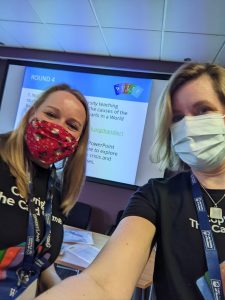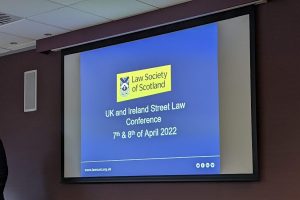
At the start of April I went to Edinburgh for my second in person conference since March 2020. The UK and Ireland Street Law Conference was hosted by the Law Society of Scotland. I was invited to co-present with Fran Ridout, Senior Lecturer in Law and Director of the Legal Advice Centre at Queen Mary, University of London. Fran studied for her MA in Academic Practice with us a few years ago and her dissertation was on Street Law teaching. Since she finished her MA Fran invited me and Chris Morrison to collaborate with her on a Street Law project, to get her students to adapt our open educational resource, Copyright the Card Game, to teach school pupils (Year 13) about copyright and sharing content online. It was a fantastic conference, really friendly and full of great pedagogic practices and ideas to inspire your teaching. The central idea about Street Law is to teach students how to teach the law to non-experts and so active learning is key. It was founded in the 1970s at Georgetown University and it’s since spread much further afield to law schools around the world. At its heart is a strong ethos around social justice.
Rob Marrs from the Law Society of Scotland opened the conference and explained how his organisation wanted make the law more accessible to students from all backgrounds. But also how it was important to teach lawyers about the need to make the law understandable to every day people. The Law Society work with lots of schools in Scotland. Rob concluded that Street Law has been one of the best things they have done.
We had an excellent opening talk from Amy Wallace, New York Law School entitled “Counterbalancing Teen Resilience on Social Media – the importance of using street law methodology to teach about current events”. Amy directs the Street Law programme at NYLS and runs Street Law Inc. The talk is based on a paper she wrote about the way to use street law to teach about current events. Young people are less likely to vote. How do we make sure they are informed to vote to be active participants in their communities? Where do they get their news from? Social media is used increasingly to get news – particularly by young people. A Reuters / Oxford University study found 50% were accessing news from You Tube, even more from Facebook. 40% getting news from celebrities and influencers. And of course there is a real concern that they are getting news from people without expertise. I was really struck by the overlaps between this talk and my interest in information literacy and the sort of teaching many librarians do, to help students be more discerning about information sources. The similarities between Street Law and my interests were clear to me from the start of the conference.
Other sessions I really enjoyed at the conference included a talk about environment rights and protection by Alannah Short and Luke McGivern, from the Law Society of Ireland. They great out a great lesson plan to engage school age students in the building of a plastics factory and the effects on a local school. Their A-Z brainstorming activity got so many of us thinking creatively!
Lucy Burrows and Rachael Kirkup from BPP University’s Pro Bono Centre gave a talk on diversity and inclusion in Public Legal Education projects. We considered some of the reasons students might not get involved in PLE projects such as financial, caring responsibilities, students with disabilities finding travel harder. We also talked about the need for diversity to ensure when advertising street law programme students saw themselves. It was a great session thinking about extra curricula activities and how inclusive they might be for all students, and emphasised why something like Street Law should be embedded in the curriculum ideally.

There were too many presentations to share them all, but what I really liked about the conference was the focus on sharing pedagogic practices, on the ethos running through Street Law which is about social justice and equity. I appreciated the opportunities we were provided with for reflection during the two days. The Copyright Card Game session ran by Fran, Meghan and I on day two was a lot of fun. We briefly explained how we had used the game with school pupils and how Fran’s Street Law students had adapted it to be a ‘Copyright Countdown’ game about sharing content online. However, the main point I wanted to stress was the links between Creative Commons, the open education movement, information literacy teaching and Street Law. I was also surprised at how few of the conference attendees had thought to use an activity based on copyright, and how none of them actually used open licensing on their teaching materials, but following the warm reception at the conference, I think there will be a number who want to try this. We just had time to play round one of the game, but it was high energy and a lot of fun, and a fantastic opportunity to meet a new community and discover we had so many shared values! I’ve got more notes, so if you are interested in finding out more, then drop me a line. Oh and Fran, Chris and I have a forthcoming publication in the Journal of Public Legal Education on our Street Law project using Copyright the Card Game, so watch this space for more.
